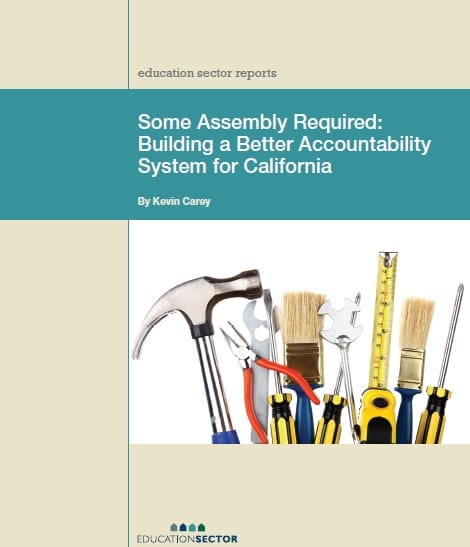 Spelunking into the labyrinthine depths of school accountability, Kevin Carey explores in this Ed Sector paper what an ideal system could and should look like. California’s endlessly vexed system serves as Carey’s entry-point, though his recommendations echo beyond the Golden State. Carey examines three central components of accountability—the kinds of information used, how it is best interpreted, and how it can most usefully promote student achievement. As he explains, sundry data are now available to link teacher and school performance with student success, not just in K-12 classrooms but in college and beyond. This allows accountability systems to focus on bottom-line outcomes, instead of imperfect proxy measures such as standardized tests. Still, there are limitations to what data can do. They can rate or rank schools (Carey cites Florida’s A-F scale as valuable in providing broad public information), but they cannot self-translate into “authentic action for reform”; they cannot show schools how to improve. To move beyond simply praising or scolding schools, Carey suggests creating an inspection system, modeled after England’s—a recommendation previously supplied by Ed Sector when Carey was there. His new model for accountability—strict adherence to outcomes data coupled with nuanced and thorough human analyses—provide sturdy pitons, thick cord, and a bright torch for those entering the dark cave of accountability.
Spelunking into the labyrinthine depths of school accountability, Kevin Carey explores in this Ed Sector paper what an ideal system could and should look like. California’s endlessly vexed system serves as Carey’s entry-point, though his recommendations echo beyond the Golden State. Carey examines three central components of accountability—the kinds of information used, how it is best interpreted, and how it can most usefully promote student achievement. As he explains, sundry data are now available to link teacher and school performance with student success, not just in K-12 classrooms but in college and beyond. This allows accountability systems to focus on bottom-line outcomes, instead of imperfect proxy measures such as standardized tests. Still, there are limitations to what data can do. They can rate or rank schools (Carey cites Florida’s A-F scale as valuable in providing broad public information), but they cannot self-translate into “authentic action for reform”; they cannot show schools how to improve. To move beyond simply praising or scolding schools, Carey suggests creating an inspection system, modeled after England’s—a recommendation previously supplied by Ed Sector when Carey was there. His new model for accountability—strict adherence to outcomes data coupled with nuanced and thorough human analyses—provide sturdy pitons, thick cord, and a bright torch for those entering the dark cave of accountability.
SOURCE: Kevin Carey, Some Assembly Required: Building a Better Accountability System for California (Washington, D.C.: Education Sector, July 2012).
